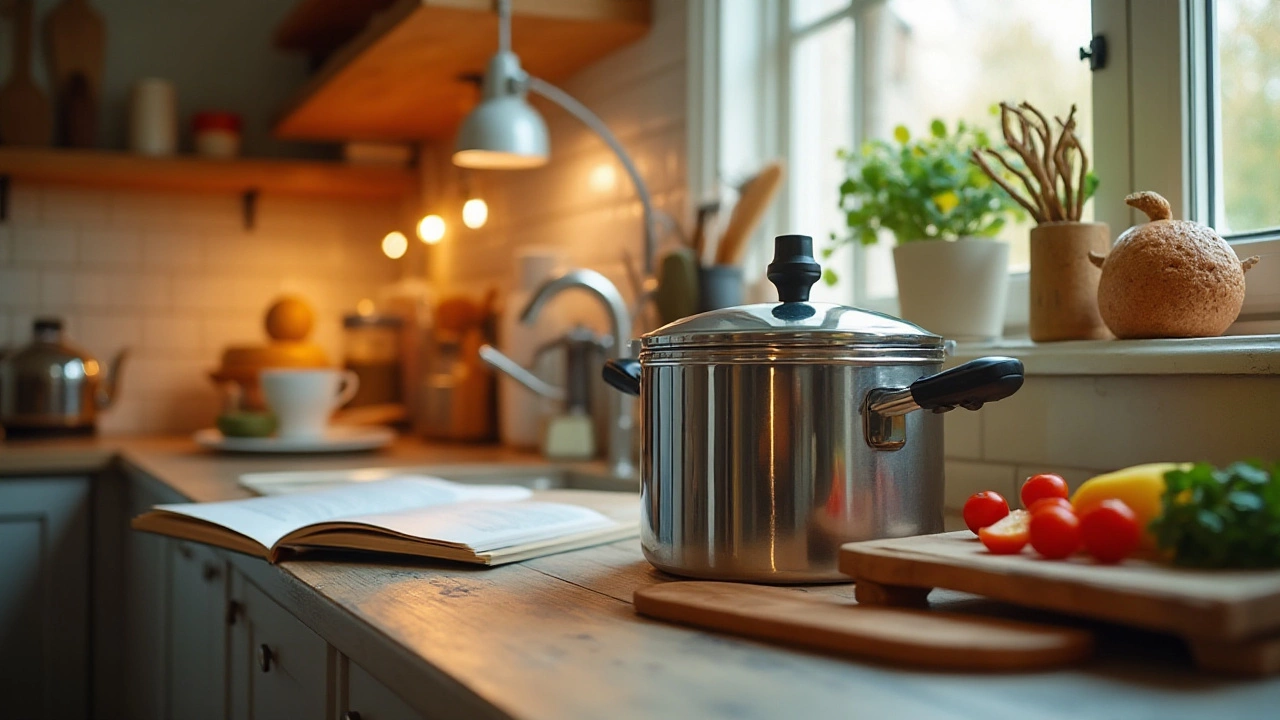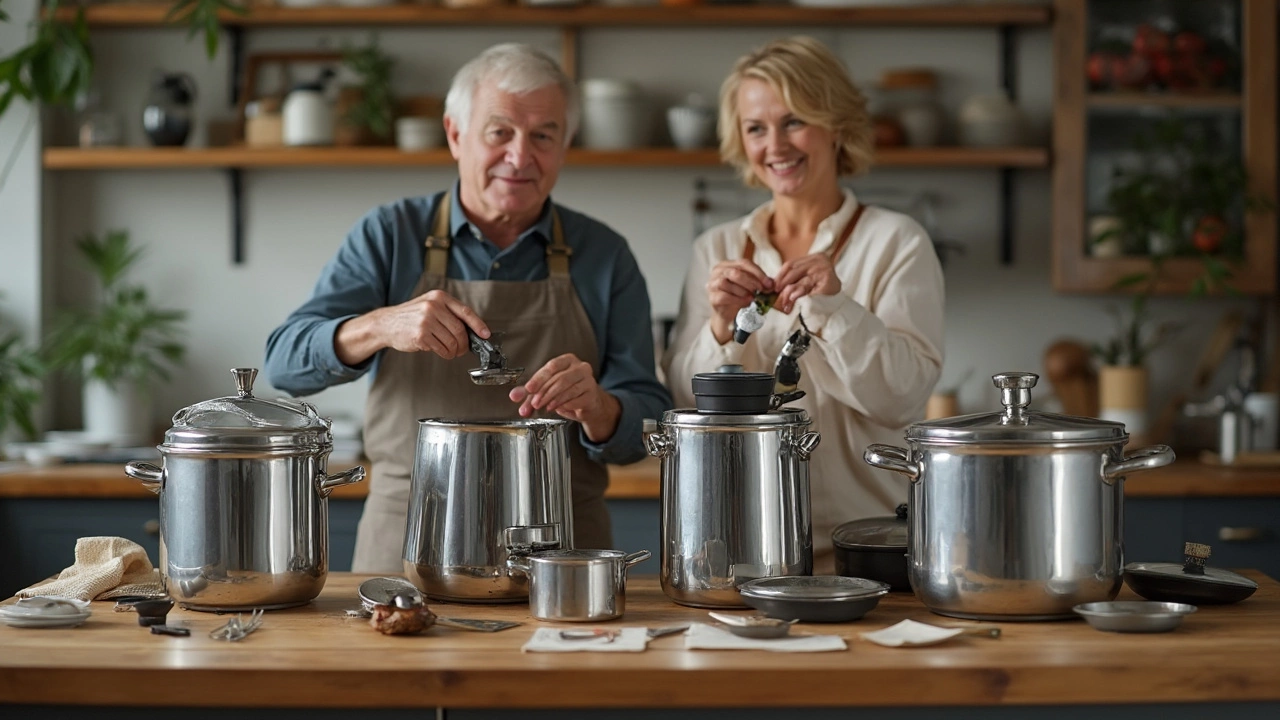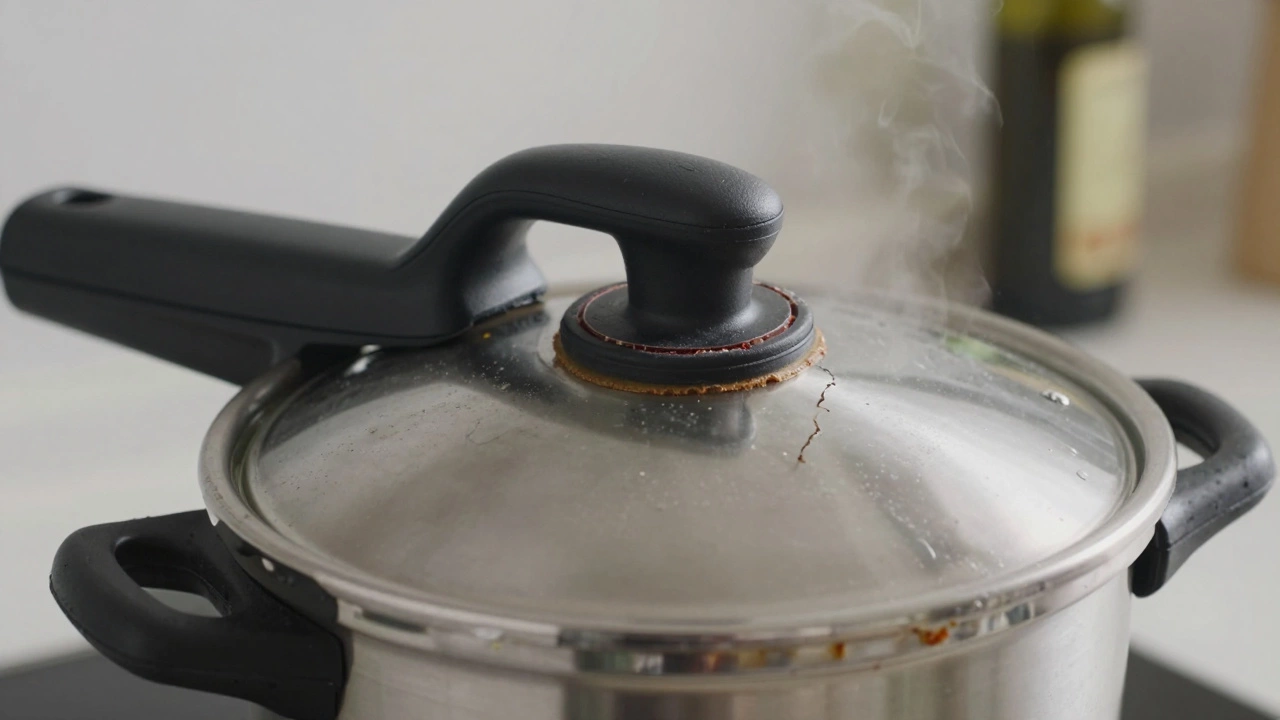Pressure cookers have become an indispensable staple in modern kitchens, celebrated for their ability to whip up meals in a fraction of the usual time. But as with any appliance, the pressing question is: how long can one expect their trusty pressure cooker to last?
The lifespan of a pressure cooker can often be a puzzle, influenced by a myriad of factors. From the quality of materials used to the care it receives over its lifetime, each element plays a part in how long this appliance stays in service. Exploring these factors can offer a clearer picture of what to expect in terms of longevity.
In this discussion, we’ll take a closer look at the different types of pressure cookers available, the key factors that impact their durability, and some effective tips to ensure yours stands the test of time. Whether you’re dealing with minor repairs or deciding if it’s time for a replacement, understanding your cooker can bring peace of mind and efficient cooking to your kitchen adventures.
- Lifespan of Different Types of Pressure Cookers
- Factors Affecting Pressure Cooker Durability
- Maintenance Tips for Longevity
- Common Repairs and When to Replace
- Choosing a High-Quality Pressure Cooker
Lifespan of Different Types of Pressure Cookers
Pressure cookers come in various types, each with its unique set of characteristics influencing its lifespan. Among the most common are stovetop and electric pressure cookers. Stovetop pressure cookers, which have been around for decades, are known for their durability. With proper care and maintenance, a quality stainless steel stovetop cooker can last upward of 20 years. Their longevity is often credited to their sturdier build, fewer electronic components, and simple mechanics. Many kitchen enthusiasts swear by these traditional models for their robust nature and reliability.
On the other hand, electric pressure cookers, which exploded in popularity in the last decade, offer more convenience with their programmable features. However, they generally don't match the lifespan of their stovetop counterparts. These cookers, filled with electronic components such as digital sensors, timers, and complex circuitry, often face lifespan limitations, usually ranging from 5 to 10 years. The more sophisticated the gadget, the higher the possibility of things going wrong, leading to a relatively shorter life. Manufacturers often recommend replacing electric models if maintenance issues start recurring frequently.
Besides the type of pressure cooker, the material they're made from significantly impacts their longevity. Stainless steel is considered the gold standard due to its resistance to rust and wear. Aluminum, while often cheaper and lighter, tends to warp under high heat and is prone to scratches and dents. The type of material truly affects not just the lifespan, but also the cooking performance and ease of use. Investing in a higher quality stainless steel model can save users from frustration and repeated purchases over time.
Interestingly, the brand of a pressure cooker can be a telling factor of how long it might last. Reputable brands often provide products constructed with better materials, backed by generous warranties, and come with efficient customer service. According to a survey by the Cookware Manufacturers Association, brands such as Instant Pot, T-fal, and Presto have been noted for their longevity and user satisfaction. The survey highlighted that consumers who opted for lesser-known brands were more likely to face maintenance issues and short lifespans. As one user commented, "Having a reliable brand behind your pressure cooker can make all the difference."
"In our research, it's evident that the lifespan of pressure cookers is not only dictated by their build and material but significantly by the frequency of use and quality of brand." — Cookware News Annual Report, 2023
Ensuring your pressure cooker lasts as long as possible involves understanding the strengths and weaknesses of each type. Picking the right type based on your usage patterns and maintenance discipline can go a long way. Whether you're more inclined towards the classic reliability of stovetop models or drawn to the ease of modern electric versions, taking the time to assess these factors ensures you make the most out of your pressure cooking investment.
Factors Affecting Pressure Cooker Durability
When it comes to understanding how long a pressure cooker will serve you in the kitchen, it's crucial to dive deep into the various factors that contribute to its longevity. Much like a well-lived life, the lifespan of a pressure cooker is subject to a wide array of influences. The first thing to consider is the material used in its construction. Stainless steel pressure cookers are renowned for their durability and resistance to rust and stain, making them a popular choice for those seeking long-term use. Meanwhile, aluminum cookers, though often lighter and more affordable, may not match stainless steel's longevity due to potential warping or discoloration over time. Users often find themselves balancing cost against durability when choosing between these materials.
Another significant factor that plays into the durability of a pressure cooker is the frequency of use. A cooker that is employed daily will naturally face more wear and tear than one used sporadically. The intensity of use, such as cooking at higher pressures or temperatures, can also affect the wear on the unit more substantially. Maintenance habits, or the lack thereof, also weigh heavily. Regular cleaning, timely replacement of rubber gaskets and properly handling those fiddly safety valves go a long way in extending the life of a pressure cooker. As Benjamin Franklin wisely noted,
"An ounce of prevention is worth a pound of cure."This age-old adage holds true for kitchen appliances just as much as it does for life itself.
Usage techniques also make a notable impact on a pressure cooker's longevity. Ensuring not to overfill the cooker, avoiding abrupt pressure release, and never using a cooker on full heat constantly are all recommended practices that protect the integrity of the appliance. Users should also pay attention to their cooker maintenance by cleaning it thoroughly after each use to avoid residue buildup that can lead to corrosion or damage. Following the manufacturer's manual is often more helpful than one might assume, offering insight tailored to the specific model's care needs.
An often overlooked yet essential aspect is the quality of water used during cooking. Hard water, laden with mineral deposits, can gradually cause blockages in vent pipes or even affect inner surfaces with unsightly scaling. This eventually impacts the pressure cooker's performance and reduces its lifespan. A straightforward solution is to use filtered water, keeping those pesky minerals at bay. Adding citric acid or vinegar to your cleaning routine can help in removing any existing scale.
Lastly, we must not forget the innovations in cookers today. Modern advancements, such as smart pressure regulation technology, digital timers, and auto-off features, contribute to not just ease of use but also longevity. These additions manage cooking variables with more precision, reducing the chances of accidents and undue stress on the machine parts. Investing in a cooker with these features may seem an upfront cost, but it can translate into savings over time by avoiding frequent repairs or replacements.
Understanding these factors and embracing proper use and maintenance will ensure that your pressure cooker not only endures but continues to perform at its best, delighting you with delicious meals for years to come. While the convenience of a pressure cooker is unmatched, its durability is significantly dependent on how well the user adheres to mindful use and care practices.
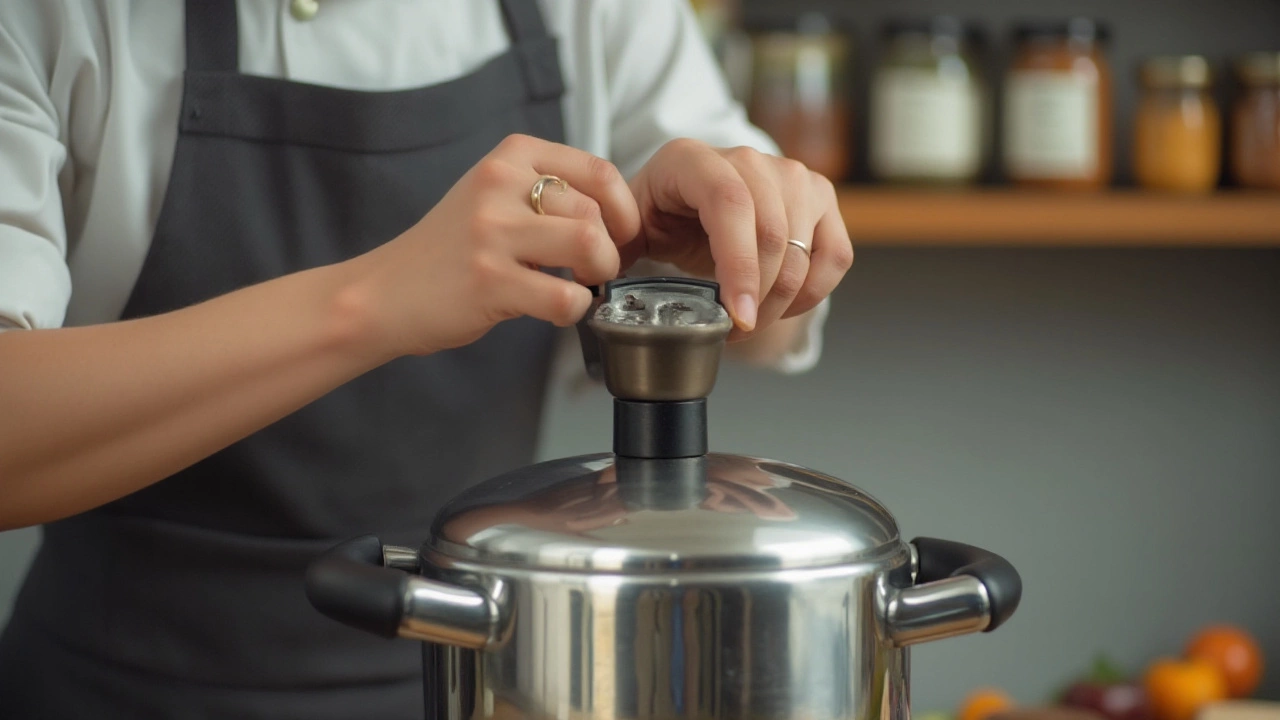
Maintenance Tips for Longevity
To squeeze the most life out of your pressure cooker, maintaining it properly is the key. Many users overlook the importance of regular checks and cleaning until something crucial goes awry. Think of it as extending a friendly hand to your appliance, helping keep its inner workings smooth and efficient. Regular maintenance is directly tied to how long your pressure cooker will last, and it begins with understanding all its parts, from the steam release valve down to the gasket. After each use, ensure that all these components are thoroughly cleaned and dried. Even the tiniest bits of food particles left behind can become a bigger problem over time, leading to blockages or damage. So, checking these details can prevent long-term issues.
One critical area people tend to neglect is the sealing ring, often referred to as the gasket, which requires a sharp eye and gentle care. When the gasket becomes old or if it happens to catch any nicks, the pressure cooker won't perform correctly. A new gasket is a simple and affordable fix that can make a huge difference in performance. Opt to replace the gasket at least once a year, and more often if you use your pressure cooker regularly. Here's a tip from Julia Child, an advocate for thoughtful cooking:
"In cooking, as in all the arts, simplicity is the signal of excellence." Keeping it simple with regular checks and replacements also signals excellence in maintaining your kitchen wonders."Remember, it's these small steps that keep a pressure cooker running effervescently, ensuring it serves you just as reliably as the first day you used it.
Don't underestimate the importance of inspecting the safety valves. A faulty valve can easily make your cooking journey take a turn for the worse. To check the safety valve, hold it up to light if possible, ensuring it isn’t clogged or stuck. Even slight mineral deposits can weaken its functionality, affecting your cooker’s lifespan. Using a soft brush and some soapy water can usually do the trick, keeping it clear and functional. It’s the consistency of these minor tasks that count, establishing a culture of care that extends not only to the pressure cooker but also to your entire kitchen.
Last but certainly not least, consider the exterior of your cooker. A wipedown with a clean damp cloth to eliminate stains after each cook can make a big difference. Keeping exterior clean isn't just about appearance but also prevents the buildup of grime that might impact parts like the handles or lid locks. Consistent care of every detail from top to base reassures that each part functions in harmony, preserving the integrity of the whole device. Addressing upkeep as a holistic approach — standing firm on simple, regular checks and thorough cleaning routines — not only extends its life but enhances safety and overall cooking performance.
Common Repairs and When to Replace
The wear and tear of a pressure cooker might not be evident in its early days, but with time, you can expect certain issues to crop up. Leaks around the seal, faulty pressure release valves, or even handles that have had better days are common troubles. The good news is most of these issues can be resolved with a bit of elbow grease and some clever know-how. Replacing the rubber gasket is perhaps the most frequent fix since it needs to be soft and flexible to maintain a tight seal. If your meals are taking longer than usual or the cooker fails to reach full pressure, this small fix might do the trick.
Another typical problem is with the pressure cooker’s vents. Over time, they might clog with food particles, affecting the cooker’s efficiency. A simple cleaning routine—detaching and rinsing them regularly—can keep them in optimal shape. Handles and locks, too, can degrade or break, especially if dropped or handled roughly. Most manufacturers provide replacement parts for these, meaning with a bit of work, your pressure cooker can enjoy renewed life.
Repair vs. Replace
Knowing when to repair and when to say goodbye to your trusty cooker can be a challenge. Consider the age of the appliance and the frequency of its use. If you’ve had it for several years and it’s giving more hassle than helpfulness, it might be time for an upgrade. Modern pressure cookers are designed with advanced technology offering better safety features, efficiency, and even digital interfaces. Weigh the cost of parts and repairs against the price of a new unit. In many cases, a new purchase may be more economical in the long run.
If your pressure cooker is still under warranty, repairs might be covered, saving you costs. Many warranties cover common failures, so it’s worth checking the policy terms. Also, if your model is a known brand, the availability of quality parts is likely. Be wary of using generic parts as they may not ensure long-term reliability. Always check for any signs of deterioration in the base of the cooker or the lid. Such damages can be critical and often indicate replacement rather than repair.
“A pressure cooker is like a loyal friend in the kitchen, but even friendships need attention and care to endure,” advises James, a seasoned culinary expert from the Kitchen Appliance Company. “Keep them clean, check for signs of wear regularly, and don’t delay simple repairs.”
Both manual and electric pressure cookers have an average lifespan of 5-10 years, but this number isn’t set in stone. With diligent care and timely repairs, your cooker can potentially last much longer. A survey by HomeCook Research in 2023 highlighted that 40% of users kept their pressure cookers in excellent condition well beyond 10 years through regular maintenance.
To summarize, being proactive with maintenance can stave off many common issues. But understanding when it’s time to let go of an aging appliance is just as crucial. Keeping a keen eye on your cooker’s performance and physical state will ensure your culinary journey remains both safe and efficient.
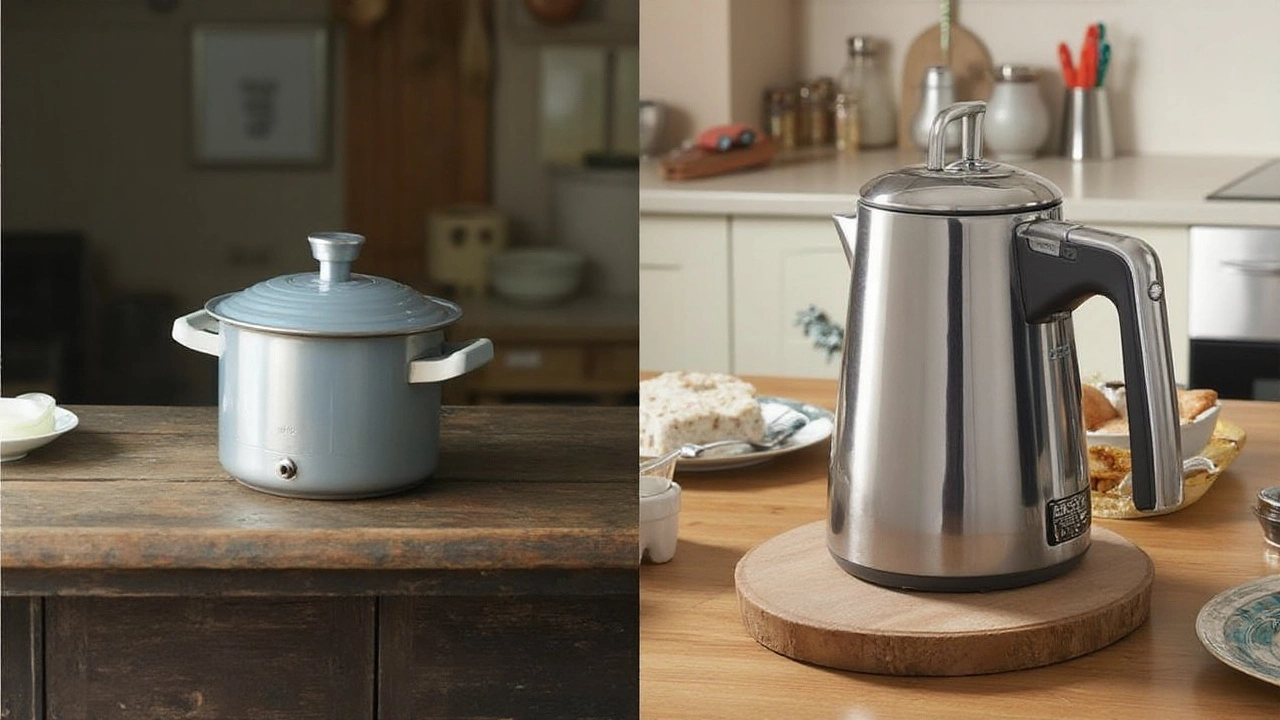
Choosing a High-Quality Pressure Cooker
Delving into the realm of pressure cookers, one soon realizes that not all are created equal. With a multitude of options available in the market today, distinguishing a high-quality model from others can be a bit of a challenge. However, making an informed decision is crucial as it not only affects durability but also the safety and efficiency of your cooking experience. When seeking a superior pressure cooker, paying attention to the materials used in construction is paramount. Stainless steel models, for example, offer robust quality and resist wear and tear better than aluminum ones. They tend to maintain their sheen over time, resisting scratches and dents, and providing a reliable cooking surface. Their higher upfront investment can save you in the long run with lesser replacements and repair needs.
One cannot overlook the significance of safety features in a pressure cooker. High-quality cookers often come with multiple safety mechanisms, such as locking lids and pressure release valves, which prevent accidents in the kitchen. Some advanced models even feature smart technology that automatically monitors pressure levels and heat, ensuring a seamless cooking experience. Engaging in a bit of research to understand these features and reading reviews from fellow users can greatly aid in making a sound choice. A high-quality pressure cooker is one that offers peace of mind alongside culinary prowess.
Consider the pressure settings offered by the cooker as well. Some meals require high pressure, while delicate dishes might benefit from low-pressure settings. A versatile cooker with adjustable pressure settings usually provides more bang for your buck, enabling you to cook a wider variety of recipes. The ease of operation, replacement parts availability, and warranty terms are other crucial factors to contemplate. Mindfully evaluating these aspects can prevent future inconveniences, allowing you to enjoy hassle-free cooking for many years.
Perhaps one of the most telling signs of a high-quality cooker is the brand's reputation and history. Esteemed brands with years of experience typically have refined their designs for safety, efficiency, and durability. They also tend to offer better customer service and support in case you encounter issues. As culinary expert Julia Child once said,
"The only time to eat diet food is while you’re waiting for the steak to cook."Good cooking appliances should enhance, not diminish the joy of cooking. Investing in a cooker from a reputable brand often ensures you won't be left wanting in terms of performance.
Lastly, it's wise to keep an eye on reviews and testimonials from verifiable users. While advertising can paint a rosy picture, real-world reviews provide unfiltered insights about what you can expect. Be on the lookout for consistent praise or critique about durability and user experience. In the realm of high-quality pressure cookers, buyers often find that spending a little extra on a reputable brand with positive reviews and comprehensive safety features pays off handsomely in the end. Such strategic choices not only promise fabulous meals but also serve up a slice of safety and quality assurance.
